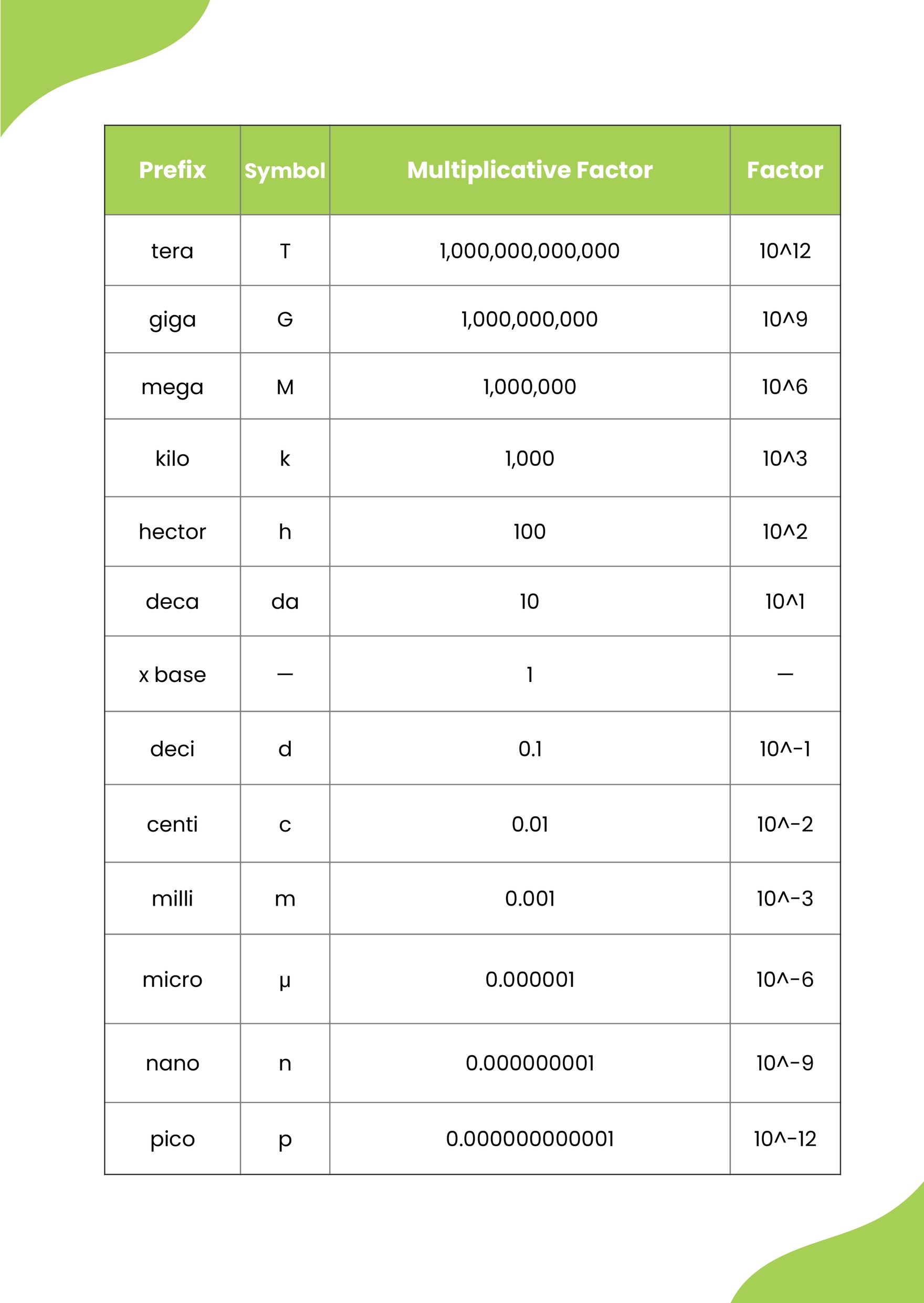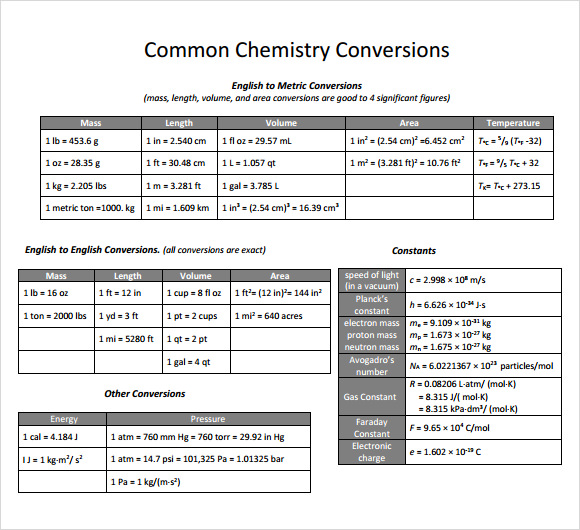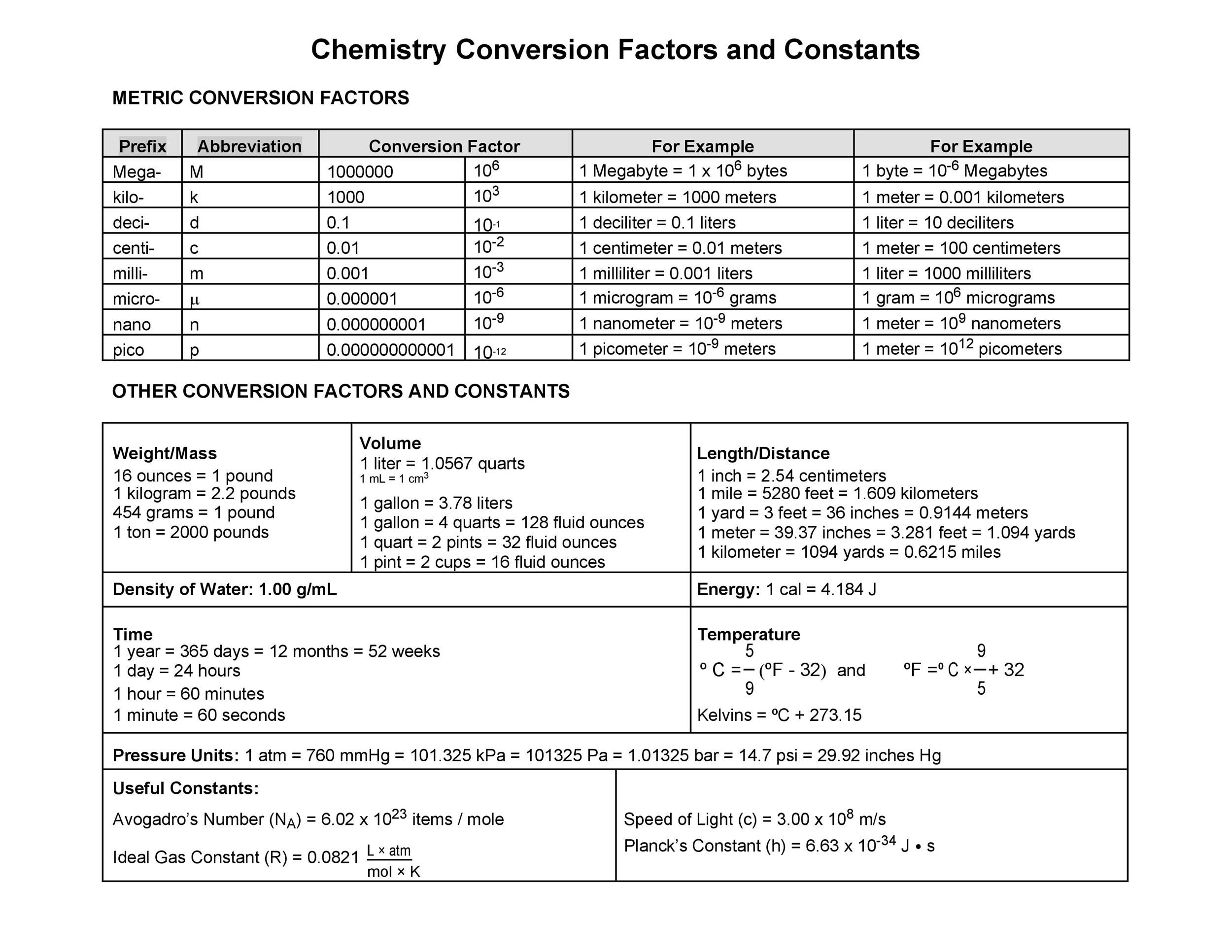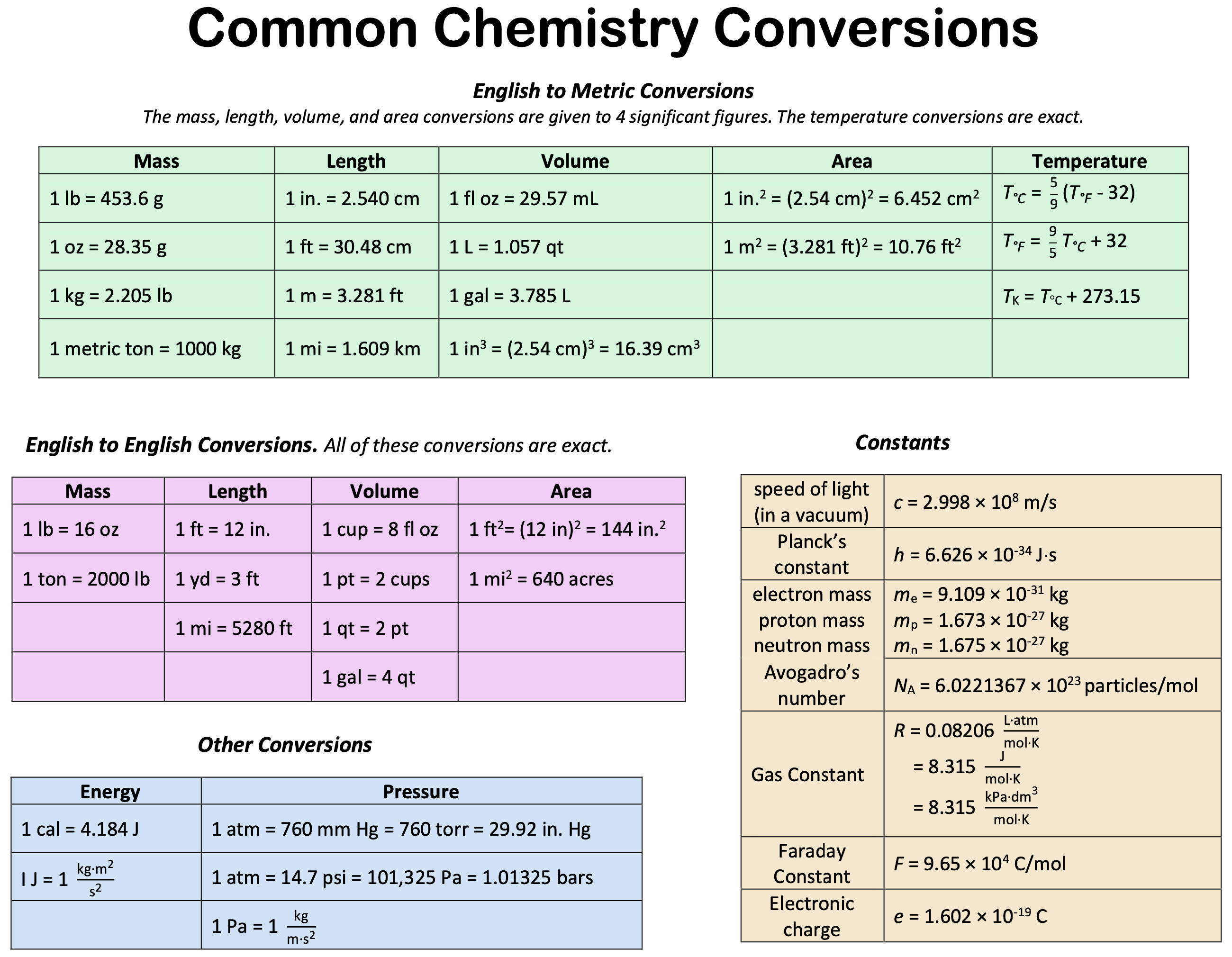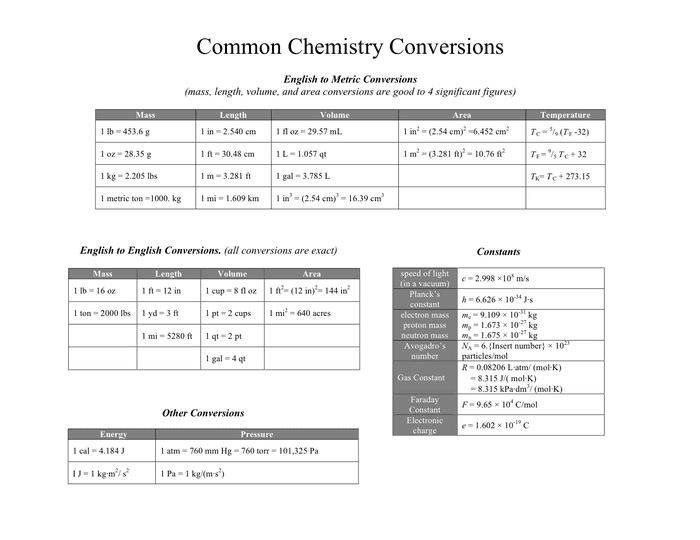Chemistry Conversion Chart
Chemistry Conversion Chart - Conversion of values in one unit to the same value in another unit using conversion factors derived from the equality between the two units is described along with the rules. If a unit to be converted is in the numerator, that unit must be in the denominator of the conversion factor in order for it to cancel. Common chemistry conversions english to metric conversions (mass, length, volume, and area conversions are good to 4 significant figures) mass length volume area temperature 1 lb = 453.6 g 1 in = 2.540 cm 1 fl oz = 29.57 ml 1 in2. For the prefixes outside milli and kilo, add 3 zeros for every unit. When converting, assign the unit to the right a value of 1 and add a zero each unit you move to the left. Start with what you know and let the conversion factor units decide how to set up the problem. 21‐sep‐2011 factors for unit conversions quantity equivalent values mass 1 kg = 1000 g = 0.001 metric ton = 2.20462 lbm = 35.27392 oz 1 lbm = 16 oz = 5 x 10‐4 ton = 453.593 g = 0.453593 kg length 1 m = 100 cm = 1000. 1 dekameter = 1000 centimeters or 1 kilometer = 10 hectometers.
For the prefixes outside milli and kilo, add 3 zeros for every unit. When converting, assign the unit to the right a value of 1 and add a zero each unit you move to the left. Conversion of values in one unit to the same value in another unit using conversion factors derived from the equality between the two units is described along with the rules. Common chemistry conversions english to metric conversions (mass, length, volume, and area conversions are good to 4 significant figures) mass length volume area temperature 1 lb = 453.6 g 1 in = 2.540 cm 1 fl oz = 29.57 ml 1 in2. If a unit to be converted is in the numerator, that unit must be in the denominator of the conversion factor in order for it to cancel. Start with what you know and let the conversion factor units decide how to set up the problem. 21‐sep‐2011 factors for unit conversions quantity equivalent values mass 1 kg = 1000 g = 0.001 metric ton = 2.20462 lbm = 35.27392 oz 1 lbm = 16 oz = 5 x 10‐4 ton = 453.593 g = 0.453593 kg length 1 m = 100 cm = 1000. 1 dekameter = 1000 centimeters or 1 kilometer = 10 hectometers.
21‐sep‐2011 factors for unit conversions quantity equivalent values mass 1 kg = 1000 g = 0.001 metric ton = 2.20462 lbm = 35.27392 oz 1 lbm = 16 oz = 5 x 10‐4 ton = 453.593 g = 0.453593 kg length 1 m = 100 cm = 1000. When converting, assign the unit to the right a value of 1 and add a zero each unit you move to the left. Conversion of values in one unit to the same value in another unit using conversion factors derived from the equality between the two units is described along with the rules. Common chemistry conversions english to metric conversions (mass, length, volume, and area conversions are good to 4 significant figures) mass length volume area temperature 1 lb = 453.6 g 1 in = 2.540 cm 1 fl oz = 29.57 ml 1 in2. Start with what you know and let the conversion factor units decide how to set up the problem. For the prefixes outside milli and kilo, add 3 zeros for every unit. If a unit to be converted is in the numerator, that unit must be in the denominator of the conversion factor in order for it to cancel. 1 dekameter = 1000 centimeters or 1 kilometer = 10 hectometers.
Chemistry Conversion Chart in PDF Download
21‐sep‐2011 factors for unit conversions quantity equivalent values mass 1 kg = 1000 g = 0.001 metric ton = 2.20462 lbm = 35.27392 oz 1 lbm = 16 oz = 5 x 10‐4 ton = 453.593 g = 0.453593 kg length 1 m = 100 cm = 1000. When converting, assign the unit to the right a value of 1.
Basic Chemistry Conversion Cheat Sheet PDF, 44 OFF
Start with what you know and let the conversion factor units decide how to set up the problem. If a unit to be converted is in the numerator, that unit must be in the denominator of the conversion factor in order for it to cancel. Common chemistry conversions english to metric conversions (mass, length, volume, and area conversions are good.
Printable Chemistry Conversion Chart Printable Word Searches
Conversion of values in one unit to the same value in another unit using conversion factors derived from the equality between the two units is described along with the rules. For the prefixes outside milli and kilo, add 3 zeros for every unit. Start with what you know and let the conversion factor units decide how to set up the.
Printable Chemistry Conversion Chart Printable Word Searches
Start with what you know and let the conversion factor units decide how to set up the problem. 21‐sep‐2011 factors for unit conversions quantity equivalent values mass 1 kg = 1000 g = 0.001 metric ton = 2.20462 lbm = 35.27392 oz 1 lbm = 16 oz = 5 x 10‐4 ton = 453.593 g = 0.453593 kg length 1.
Chemistry Conversion Chart Cheat Sheet
For the prefixes outside milli and kilo, add 3 zeros for every unit. When converting, assign the unit to the right a value of 1 and add a zero each unit you move to the left. Common chemistry conversions english to metric conversions (mass, length, volume, and area conversions are good to 4 significant figures) mass length volume area temperature.
Printable Chemistry Conversion Chart Printable Word Searches
If a unit to be converted is in the numerator, that unit must be in the denominator of the conversion factor in order for it to cancel. Conversion of values in one unit to the same value in another unit using conversion factors derived from the equality between the two units is described along with the rules. Start with what.
Conversions and Constants Chemistry LibreTexts
Common chemistry conversions english to metric conversions (mass, length, volume, and area conversions are good to 4 significant figures) mass length volume area temperature 1 lb = 453.6 g 1 in = 2.540 cm 1 fl oz = 29.57 ml 1 in2. Conversion of values in one unit to the same value in another unit using conversion factors derived from.
Printable Metric Conversion Chart For Chemistry
For the prefixes outside milli and kilo, add 3 zeros for every unit. Common chemistry conversions english to metric conversions (mass, length, volume, and area conversions are good to 4 significant figures) mass length volume area temperature 1 lb = 453.6 g 1 in = 2.540 cm 1 fl oz = 29.57 ml 1 in2. Start with what you know.
Printable Metric Conversion Chart For Chemistry
Common chemistry conversions english to metric conversions (mass, length, volume, and area conversions are good to 4 significant figures) mass length volume area temperature 1 lb = 453.6 g 1 in = 2.540 cm 1 fl oz = 29.57 ml 1 in2. 1 dekameter = 1000 centimeters or 1 kilometer = 10 hectometers. When converting, assign the unit to the.
Chemistry Conversion Chart Printable
Conversion of values in one unit to the same value in another unit using conversion factors derived from the equality between the two units is described along with the rules. Common chemistry conversions english to metric conversions (mass, length, volume, and area conversions are good to 4 significant figures) mass length volume area temperature 1 lb = 453.6 g 1.
Common Chemistry Conversions English To Metric Conversions (Mass, Length, Volume, And Area Conversions Are Good To 4 Significant Figures) Mass Length Volume Area Temperature 1 Lb = 453.6 G 1 In = 2.540 Cm 1 Fl Oz = 29.57 Ml 1 In2.
For the prefixes outside milli and kilo, add 3 zeros for every unit. If a unit to be converted is in the numerator, that unit must be in the denominator of the conversion factor in order for it to cancel. Conversion of values in one unit to the same value in another unit using conversion factors derived from the equality between the two units is described along with the rules. 1 dekameter = 1000 centimeters or 1 kilometer = 10 hectometers.
When Converting, Assign The Unit To The Right A Value Of 1 And Add A Zero Each Unit You Move To The Left.
21‐sep‐2011 factors for unit conversions quantity equivalent values mass 1 kg = 1000 g = 0.001 metric ton = 2.20462 lbm = 35.27392 oz 1 lbm = 16 oz = 5 x 10‐4 ton = 453.593 g = 0.453593 kg length 1 m = 100 cm = 1000. Start with what you know and let the conversion factor units decide how to set up the problem.
